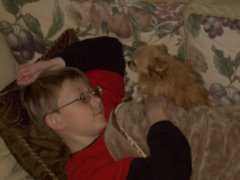"Poetry is full of surprises."
Predictable subjects can still surprise.
Theme: What a says about its subject.
Tone: The feelings or attitude about the theme.
Common themes: Love, death, marriage, childhood, specific event, an inanimate object, flora, animals, ocean, a meal, growing up, declaration of feeling/independence...pretty much anything can be made into a poem.
"Barbie Doll" by Marge Piercy
Wow...with the imagery of childhood toys, this poem speaks to a dead woman who could not bear to live in a world that sees physical perfection as the highest currency.
The title brought the expectation for me that the poem would be about a favorite childhood toy, yet as I read the comments she heard from others, "exercise, diet, smile, and wheedle." I was led to the theme that it's common to feel we don't live up to others expectations. "To every woman a happy ending." seems to allude to the idea that in the end, she was dressed up pretty and got a new nose from the mortician, "a turned-up putty nose." and finally she looked good! Such a sad poem, really hit home about "fitting in" and how cruel people can be. I think the tone of the poem was sarcasm...as if...."are you happy now, jackass...she's pretty. She may be dead, but she looks good!"
The speaker: a family friend...a neighbor...some one who saw or heard what comments were made to the girl about her physical characteristics...yet just seems to be watching from beyond interaction and sees the hypocracy of the conditional love and then expresses the sarcastic telling of the sad turn of events.
"Leaving the Motel" by W. D. Snodgrass
Snodgrass...love that name!
Anyway, the theme is romance and a one-nighter. "We've nowhere we could keep a keepsake-"...like it's a clandestine meeting, private and secret. The tone is acceptance for a temporary pleasure. Hmm...could be something else, like...sweet memories. "That's all. We can't tell when we'll come back, can't press claims, we would no doubt have other rooms then, or other names." They have checked into separate rooms, under assumed names, and join in one room only to cover their affair. They might get to meet again, yet...who know when...and who knows what name they'll use next time. There are no names mentioned in the poem, so that keeps the "secret" facade going...and the acceptance of the limitations of their relationship and no discussion of the physical intimacy they shared, only the terms of their meeting. Sad, and happy...glad they could find some temporary happiness and pleasure and sad that they have to sneak around to get it. Maybe "lilacs" is a metaphor for the love they made...and that the flowers are left behind in the rented room at their "wayside" meeting place?
"Woodchucks" by Maxine Kumin
The theme is animals..."The food from our mouths, I said, righteously thrilling to the feel of the .22, the bullets' neat noses. I, a lapsed pacifist fallen from grace." The animals the speaker had tried to kill with cyanide had a percentage of survivors who were hiding below where the poison couldn't reach. The tone is anger...the writer, feeling he was a non-violent man, was brought to anger and violence with his anger toward the food thieves. I think the speaker is a man, the provider of the family...and felt vexed by the survival of the little animals which now lived to eat their food. Then, the speaker writes about shooting the survivors...like a triumph over an enemy, "Ten minutes later I dropped the mother." And, there is one more left...and he hunts this one at night and he dreams of killing it, "I sight along the barrel in my sleep." Eeww! This guy has an axe to grind...just waiting to pick off the last one! Then, he uses the simile of the Nazi camps of death that he wished they had all died without a fight with the first poisoning attempt....unseen, as if he didn't see the prisoners at the internment camps of Hitler, yet he knew there was death, "If only they'd all consented to die unseen gassed underground the quiet Nazi way."I wouldn't equate the murder of scores of human with a few garden-eating rodents...yet the idea of how badly the speaker wanted them all dead really came across. Wow! I just read the paragraphs about the poem on page 425 and the speaker was a woman! I really called that one wrong! She's a gritty and angry survivor...ain't she? And, so crass and cold.
Wednesday, March 28, 2007
Subscribe to:
Post Comments (Atom)



No comments:
Post a Comment